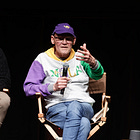James Carville: 'I Think We're Going to Win.' If Not? 'I'm Going to the Caribbean'
For the legendary Dem strategist and his documentarian, Matt Tyrnauer, the first campaign is the election. Then come the Oscars

We have nominations! Real nominations! Thanks to the perennially very early Gotham Awards some of this year’s awards hopefuls officially have points on the board, despite the fact that we have a full two months before actual Oscar voting begins and some, uh, more important votes to get to first.
Most of this week’s newsletter is about that other election, talking to documentarian Matt Tyrnauer as well as the subject of his latest film, James Carville. Making its way through regional festivals in the very anxiety-inducing weeks before the election, the film Carville: Winning is Everything, Stupid makes the case for engaging in politics the way veteran strategist Carville does: All day, every day, with as much enthusiasm and real talk as you can muster.
You don’t get a whole lot of either when it comes to awards campaigns, which makes Winning is Everything a funny bedfellow at these Oscar precursor festivals in places like Middleburg and the Hamptons. Tyrnauer talked to me about the parallels he’s found between a life in movies and in politics, and Carville shared a genuine hope that it might inspire people to follow in his footsteps — because a life in politics is a lot more fun than it might seem.
But before that, a somewhat deeper dive into the Gotham Awards nominations, and why these tiny awards voted on by tiny groups of people might be more impactful than you think.
Gotham Games
The Gotham Awards may be pretty small potatoes compared to the awards season onslaught still to come, but they are almost always the first out of the gate, with this year’s nominations announcement happening Oct. 29. (See the full list here). We exhausted awards pundits, looking for something even resembling consensus, must thank them every year.
The awards, handed out in a Dec. 2 ceremony in New York City, are selected in both the nominee and winner stage by small juries of critics and industry professionals, which means they have very little in common with awards chosen by giant bodies like the Oscars, SAG Awards, etc. So when you’re looking at a supposed snub of something like The Brutalist, which was left out in both the feature and director categories, you’re really just talking about the same group of five people who made up the jury for both categories. (My friend David Ehrlich was among them; my complaint has been filed.)
But juried awards often make for some great selections, and this year’s Gotham nominations are almost uniformly excellent. They gave a boost to some films that were already in the awards hunt — including Anora, Nickel Boys and Sing Sing — as well as a nudge to some more on-the-bubble contenders. If Amazon/MGM needed another reason to put some real campaign might behind Challengers, its nomination for best feature really should do the trick.
Many of the acting nominees will likely continue showing up on critics’ lists and among Oscar precursors— I was particularly gratified to see Marianne Jean-Baptiste’s lead acting nomination for Hard Truths, and some attention for Anora’s Yuriy Borisov in addition to the expected nod for star Mikey Madison.
But for films that are less likely to be major awards players, the nods may mean even more. Justice Smith and Brigette Lundy-Paine are an incredible pair in I Saw the TV Glow, and the Gotham nominations for each were well-deserved even if they’re the only ones they get. Saoirse Ronan in the Sony Pictures Classics release The Outrun and Adam Pearson in A24’s A Different Man both give exceptional, acclaimed performances, but risk being overshadowed later in the season by splashier films from each distributor.
How much do the Gotham Awards really influence the Oscar race? The responsible thing to say is “not at all,” both because they’re voted on by a tiny number of people and because they happen so early that only the real diehards (hi!) are tuned in.
But the past few years suggest a different story.
Justine Triet and Arthur Harrari won the Gothams’ screenplay award for Anatomy of a Fall months before they did the same at the Oscars, and Everything Everywhere All at Once and Key Huy Quan both started their awards season sweeps at the Gothams. In both cases, the Gothams may have simply been confirming momentum that was already out there, not creating a new boost, but the impact was more or less the same: First comes a Gotham Award, followed by a whole lot of others.
Then again, the Gothams tend to favor the critical darlings, and just as often they don’t make it across the Oscar finish line — just ask last year’s acting winners Charles Melton and Lily Gladstone. There’s no budget cap to be eligible for a Gotham Award anymore, but they still skew indie; if Gladiator II or Wicked or even Dune: Part II is going to swallow the competition whole, the Gothams won’t stand in the way.
But in a best picture race this wide-open, critical darlings still have time to solidify themselves as across-the-board frontrunners. A Gotham win, no matter how few people actually vote on it, can sometimes have the power to do just that.
Nerves of Steel
James Carville does not have time to deal with your personal election anxieties.
The veteran political strategist is approached everywhere he goes — “drugstores, airports, hotel lobbies,” he says — by people asking him for reassurance that Kamala Harris is going to win the election. That’s one of the reasons he wrote his op-ed in the New York Times last week, confidently predicting just that.
Having been inside many political campaigns, from some bruising defeats in the '80s to his surprise, career-making victory with Bill Clinton in 1992, Carville understands the nerves in the week before an election, particularly this one. “The entire Constitution rests on the outcome of this election,” Carville says from what’s a pretty familiar place for him: An airport boarding gate. “I think we’re going to win. But it is nerve wracking.”
When we chat, Carville is wearing the rugby shirt in LSU colors that has defined his look since the days of The War Room, which is probably why so many people approach him in public. But instead of focusing on being stressed, he says, “I’m trying to think of, how can we win the election? What’s the next thing I could do? I just can’t be worried about your neurosis or your anxieties. You have to gut it out and do it yourself.”
Carville, who turned 80 on Oct. 25, holds a distinct position in both the political world and in the culture. Tyrnauer, his documentarian, asserts, “He’s become the elder statesman of the Democratic Party, but he’s a new type of elder statesman. He doesn’t really have a mantle. He’s a major celebrity, as well as being a political strategist by trade. And people listen to him.”
It’s Campaign Season, Stupid
Carville: Winning is Everything, Stupid follows its subject through what turns out to be one of the most tumultuous periods in history for the Democratic party. Early in the film we see Carville react to a May 2023 poll showing Joe Biden lagging behind Donald Trump, which prompts Carville to declare publicly and forcefully that Biden was destined to lose. That stance was not a popular one 18 months ago, which feels hard to remember now.
Related:
“Historians will be writing about this collective phenomenon of a party with its head buried in the sand like a giant ostrich for months, maybe even years, about something that was glaringly, painfully obvious to a lot of people,” Tyrnauer says. “But Carville became the most consistent and loudest voice calling that out. I was documenting this extraordinary thing, and no one knew how that would come out.”
In the weeks after Biden’s disastrous debate in June, more people joined Carville in calling for him to exit the race, including a handful of Hollywood heavyweights. Carville says he’s never spent as much time in Hollywood as he has in the past six weeks, promoting the film, but credits the stars for helping Biden make the right choice.
“Hollywood is like anything else — it has a lot of different people that have a lot of different opinions,” Carville says. “They tend to not keep them to themselves. And I think that at the end of the day, almost a person, most of the influential people in Hollywood have been quite helpful.”
Carville will be contributing to election night coverage alongside Brian Williams on Prime Video, and is still optimistic, he promises. But he also says he has a post-election plan if things don’t break his way: “If Harris loses, I think I’m going to the Caribbean.”
‘I Didn’t Know That Thing Was So Much Fun’
Winning is Everything was picked up by CNN Films following its Telluride premiere, and has since been making its way to various regional festivals, where Tyrnauer, too, is now being asked how the election will turn out. His 2009 documentary Valentino: The Last Emperor was shortlisted for the Oscars, so Tyrnauer sees the parallels between the awards campaigns and political campaigns now happening simultaneously — and Carville is starting to see it, too.
“He sees it as a campaign, and it’s really fun to talk to him about it,” Tyrnauer says, pointing out that when you’re campaigning a film — as when you’re campaigning a candidate — you spend a whole lot of time in hotel rooms. “The minute I say three words about what we’re doing that day, it clicks in for him. It’s like, okay, I got it. And you can see him running it through his strategist brain, and he comes up with a little plan.”
(Carville, for his part, says of all the movies he’s encountered on the festival circuit, he’s eager to see the movie that’s the most explicitly about an election: Conclave).
The main purpose of the fall release, though, is to get it in front of viewers before the election. Winning is Everything premiered on CNN on Oct. 5 and is still playing in theaters around the country; it will stream on Max beginning Nov. 14.
Since 2016, Tyrnauer has seen it as his duty to make films that address the rising authoritarian tide in America; his 2019 film Where’s My Roy Cohn? explored Donald Trump’s origins at the elbow of Roy Cohn years before this year’s The Apprentice. “I think anything that I make in these really perilous, fucked up times politically — where at least half of Americans seem to be sleepwalking through an existential threat to the Republic — has to be at least in part about what is going on and how to be aware of it,” he says.
By making a movie about Carville specifically, Tyrnauer is trying to show audiences “how to be politically aware and politically effective in how to gain power through political action.” Carville knows there’s a lot of cynicism around that idea these days, but agrees that the movie might be able to change that. “Politics has gotten a bad name. Hopefully talented young people will see it and say, ‘Those people look like they’re having a good time. I didn’t know that thing was so much fun.’”



